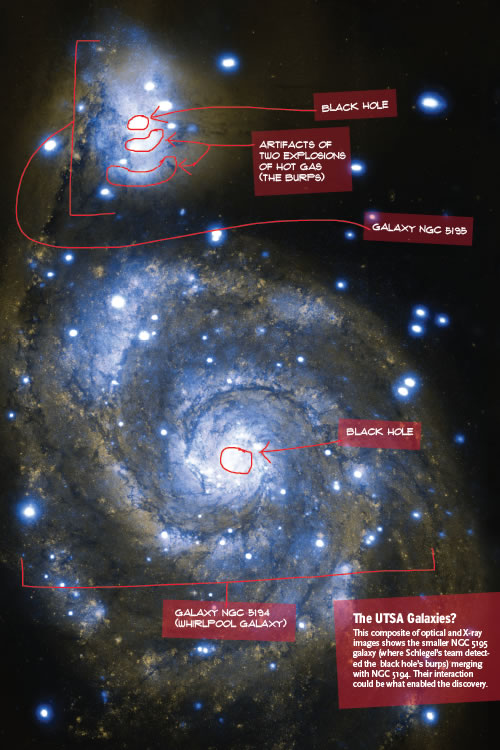The Burp Heard Round the World
UTSA astrophysicist Eric Schlegel has been talking a lot about black holes lately, but we still have questions about the facts versus the fiction

From their belching discovered 26 million light-years away across the universe to Stephen Hawking’s declarations that humans should harness their energy to power the Earth, black holes are having a moment. But they’re nothing new for UTSA astrophysicist Eric Schlegel. He’s the guy who made international headlines this year after documenting what his team coined a “burping black hole.”
Want to be part of the conversation but think the concept sounds a bit strange? No worries. Schlegel is here to help. The Vaughan Family Professor in UTSA’s physics and astronomy department sat down with Sombrilla Magazine to bring everyone up to warp speed on this space phenom.
OK, exactly what is a black hole?
It is a mass that has shrunk sufficiently in size so that its gravitational pull is so strong that no amount of energy expended by you—or anything else, not even light—will escape. They come in two size ranges: stellar (with typical masses of a few times that of our sun) and galactic (with typical masses of a million to a hundred million times that of our sun).
What does this burp thing actually mean?
For an analogy, astronomers often refer to black holes as “eating” stars and gas. This black hole is blasting hot gas and particles back into its surroundings. All of that may have been triggered by the interaction of the small galaxy we observed with its larger spiral companion, causing gas to be funneled toward the black hole. The energy generated by this in-falling matter would produce the outbursts. So, apparently, black holes can burp after their meal. Our observation is important because this behavior would likely have happened very often in the early universe, altering the evolution of galaxies. It may be common for big black holes to expel gas outward, but it is rare to have such a close, resolved view of these events.
So black holes are important?
Yes, for several reasons. First, they are an endpoint for the evolution of massive stars. Second, they appear to form in the center of galaxies and may dictate some of the subsequent evolution of their host galaxy. Third, in the evolution of the universe, their existence gradually robs the universe of the mass needed for other stars to form.
Can we travel through them? Because Star Trek says we can.
No, you can’t. The problem every sci-fi story overlooks in using black holes for time or space travel is the so-called tidal force. It is not a real force but the difference in the gravitational force between one side and the other.
As for Star Trek and its science, Deep Space Nine had travel via a wormhole, an equally sci-fi device with no basis in reality currently.
Can we at least get sucked into one? And if we can, do we break apart into a bunch of pieces?
As my students not majoring in astronomy learn: Black holes do not suck! No more than any other source of gravity. The difference is the size (and thus density and gravitational pull). For their mass, black holes are really small; hence, if you get sufficiently close to one, you can’t commandeer enough energy to escape.
So, yes, if you fall toward a black hole, you reach a point where the difference in gravity between your feet and your head exceeds the forces holding your body together. You’d split in half, and then those halves would start to split, and so on until, presumably, you are down to your component atoms. For all we know, perhaps they are ripped apart too. But it would occur as fast as you fall, not in slow motion, as is often shown.
Finally, is it true that you and Neil deGrasse Tyson go to the movies together and ruin them for everyone else by saying things like “That couldn’t happen!” throughout the entire film?
[Laughs] I can’t speak for Neil, but I suspect everyone with a science background groans when each sees something that conflicts with the real universe. I try to keep my groans to myself to avoid having my wife, Lisa, use a sharp elbow on me. But occasionally, it’s just too difficult. If I think the movie will be racking up lots of groans, I just wait for it on Netflix or DVD so that I disturb only our pets.
I generally am willing to suspend some judgment unless the plot hinges on the science. For example, I came very close to ruining Interstellar for everyone when the astronauts visit that first planet—
Uh, on second thought—you know, for your wife’s sake—let’s not get you started. Excellent idea.
Do you have a question about science or literature or any other topic that’s always made you wonder “What? How? Why?” but you never got around to looking into it? Let us know by sending an email to sombrilla @utsa.edu or commenting, below, and we’ll find a UTSA expert to explain it.
